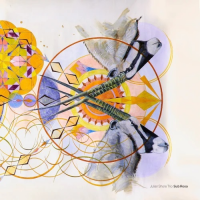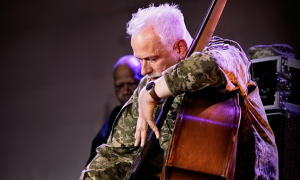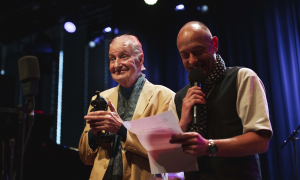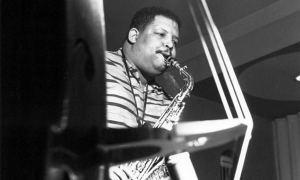Home » Jazz Articles » Profile » Arthur Blythe, 1940-2017: A Remembrance
Arthur Blythe, 1940-2017: A Remembrance
Blythe's musical cohorts and fans remember him with deep emotion and respect. As drummer Dougie Bowne recalls: "I saw Arthur Blythe (at the Tin Palace) a bunch, maybe it was three or four times, but it seems like a million, it was so important to me—intense and passionate and intelligent, his robust vibrato shaking off the tin ceiling that the joint was named for... meant the world to me, hearing these guys just then, traveling back and forth between the worlds... I never got to meet the man himself, and that saddens me now. I would like to have told him how important his music was to me, and still is, but I'd want to tell him about the walk from CB's (rock club CBGB) to the Tin Palace, that short, almost a block walk, and tell him how much his shit meant to me. I like to think he'd understand the real distance that the walk described, and I'd also like to think I'd be able to say thank you for being the destination, so often, and so fully."
Born in Los Angeles, Blythe moved to San Diego as a young boy and began playing the saxophone when he was nine. He found work in R&B bands as a teenager but fell in love with jazz before he finished high school.
Back in L.A., Blythe fell in with the circle surrounding pianist/composer

Horace Tapscott
piano1934 - 1999

David Murray
saxophone, tenorb.1955
Writer Willard Jenkins: "I presented him very early on in my concert presenting years, in the early '80s with a Northeast Ohio Jazz Society presentation at Cleveland State University. My earliest encounters with Arthur Blythe's unforgettable sound on the alto came during his time with Horace Tapscott's big band, back when Arthur was billed as Black Arthur. I also fondly recall seeing him do alto battle on one of George Wein's festivals alongside
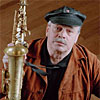
Phil Woods
saxophone, alto1931 - 2015

Paquito D'Rivera
clarinetb.1948
A few years later, Blythe headed for New York where he hoped to find new inspirations and opportunities. He was eventually hired by drummer

Chico Hamilton
drums1921 - 2013

Gil Evans
composer / conductor1912 - 1988

David Sanborn
saxophone1945 - 2024

Bob Stewart
tubab.1945
After spending time with

Lester Bowie
trumpet1941 - 1999

McCoy Tyner
piano1938 - 2020

Woody Shaw
trumpet1944 - 1989

Jack DeJohnette
drumsb.1942
His first album as a leader, 1977's The Grip, teamed him with Stewart, cellist Abdul Wadud, drummer

Steve Reid
drumsb.1944
Saxophonist/bandleader

Russ Gershon
multi-instrumentalistb.1959
Drummer Ronnie Burrage: "Arthur Blythe was a musician's musician. His sound and soul would resonate so deep in my spirit, he made me smile no matter what the music is we were playing and made everything more beautiful! When I had any opportunity to hear Arthur play I made sure to be there just to get that magic he made. His notes were so pure and soared to the heavens. When Arthur asked me to play with him on occasion it was a dream; he was open, he was experimental, he was incredibly soulful and the music always expanding... I believe what always stayed with me was the fact that Arthur was present in the clubs supporting my efforts as a band leader, and he gave me so much joy in being able to play with such a master of his instrument... The sound Arthur produced took me somewhere mystifying."
Surprising the industry, in 1978 Blythe landed a recording contract with Columbia Records, a label not exactly known for its willingness to reach out into free jazz. A long string of phenomenally executed, well-received albums followed: In the Tradition, Lenox Avenue Breakdown, Illusions, Blythe Spirit, Elaborations, and the stellar Monk tribute Light Blue, which completely changed this writer's perception of where jazz could still go. His Columbia run lasted until 1987, when the label shifted its attention to promoting Wynton Marsalis and a more traditional bent of jazz.
Guitarist
Kelvyn Bell
guitarIn 1986 Blythe became part of the supergroup The Leaders alongside

Don Cherry
trumpet1936 - 1995

Chico Freeman
saxophoneb.1949

Don Pullen
piano1941 - 1995

Cecil McBee
bassb.1935
Mallet artist Gust William Tsilis: "I had the good fortune of meeting Arthur in 1986. He was a resident in our building at 860 Riverside Drive, New York, NY. It took some time to get close to him, but after that he was the best friend anyone could hope for. His loyalty, compassion, dignity and the natural ability to be honest and forthright were always impressive to me. Most of the people who got to spend time with him knew he was a man of few words, but whenever he spoke he meant all he said. I knew Arthur for 31 years, and in that time I never heard him cast a disparaging remark to the universide. He transcended the negative and always embraced love and respect."
"He was a man of high intelligence and a proud man who did not look down upon others. He once told me there was a saying he had heard which was attributed to

John Coltrane
saxophone1926 - 1967
Blythe remained in demand as a sideman, taking part in unusual projects with Gust William Tsilis (Pale Fire, 1987); cellist David Eyges (Synergy, 1997); drummers

Gerry Gibbs
drumsb.1964

Joey Baron
drumsb.1955

James Blood Ulmer
guitarb.1942
From 2000 to 2003, Blythe cut a series of exceptional discs for the Savant label, including Hicks, Stewart, and drummer Cecil Brooks III. His last recording before his illness took him off the scene was Ace (2004), with David Eyges and drummer Abe Speller.
Writer W. Royal Stokes: "I last caught Arthur Blythe at D.C.'s The Caverns, c. 2000 with cellist David Eyges. He had made a rare visit to the East from California. We had a nice chat between sets. He was not only an extraordinary musical artist, he was a most simpatico individual and warm person. He will be missed by all who knew him and by the many who experienced his art."
Tags
Arthur Blythe
Profiles
Todd S. Jenkins
Los Angeles
San Diego
Horace Tapscott
David Murray
Phil Woods
Paquito D'Rivera
Chico Hamilton
Gil Evans
David Sanborn
Bob Stewart
Lester Bowie
McCoy Tyner
Woody Shaw
Jack DeJohnette
Steve Reid
Russ Gershon
Kelvyn Bell
Don Cherry
Chico Freeman
Don Pullen
cecil mcbee
John Coltrane
Gerry Gibbs
Joey Baron
James Blood Ulmer
Comments
PREVIOUS / NEXT
Support All About Jazz
 All About Jazz has been a pillar of jazz since 1995, championing it as an art form and, more importantly, supporting the musicians who make it. Our enduring commitment has made "AAJ" one of the most culturally important websites of its kind, read by hundreds of thousands of fans, musicians and industry figures every month.
All About Jazz has been a pillar of jazz since 1995, championing it as an art form and, more importantly, supporting the musicians who make it. Our enduring commitment has made "AAJ" one of the most culturally important websites of its kind, read by hundreds of thousands of fans, musicians and industry figures every month.






 Buy Now
Buy Now




